I didn’t write any film reviews in 2023. It’s not because I’ve given up on film criticism. It’s because I was busy being a professor, writing another book on theology and film, and attempting to be present with my family. And yet, I still managed to watch 300 films over the past year, 82 of which were 2023 releases. It’s the most I’ve watched since returning to the US after living in Scotland. I hope to watch even more in 2024.
The following films are my top 20 films from 2023. These are not necessarily the “best” or “greatest” films of the year; they are simply my twenty favorite films at the moment. There are critically-acclaimed 2023 films I’ve yet to see (The Zone of Interest, Society of the Snow, Priscilla, Godzilla Minus One, Return to Seoul), as well as critically-acclaimed films I’ve seen that I do not recommend (Poor Things, Origin, Saltburn).
If there is a discernible theme in my list, it’s dialogue. I don’t just mean the dialogue written in the scripts (though many of these films feature incredible writing, and there are a lot of “talky” films here). I mean that these are films which promote discussion, discourse, dialectic—they are movies you want to talk about afterwards in order to better understand and appreciate the truth, beauty, and goodness therein. These are films about conversational exchanges between characters, movies, genres, time periods, cultures, imaginations, etc. These are films which demonstrated the invisible bridges created between others through communication, as well as communicated about the tragic limits of such bridges. These are films about how opposites attract, about soulmates and doppelgängers, about individuals in critical dialogue with their communities, about the roles we perform in both fictional and real worlds. In nearly all of the film stills I’ve included below, there are two characters situated within the frame, attempting to communicate with one another or find a connection. And I think it’s noteworthy that I have a two-way tie for my #1 film(s) of 2023, as the two films in that top spot were a cultural conversation-starter in themselves.
So, why do I create these year-end lists? I hope they serve as a means of dialogue too—a dialogue between you and me, dear reader, a possible conversation-starter as we both experience these cinematic works of art and discuss them wherever and however we can. Thank you for reading, and I hope to write more film reviews (i.e. conversation starters) in the year ahead.
20. Past Lives (Celine Song)
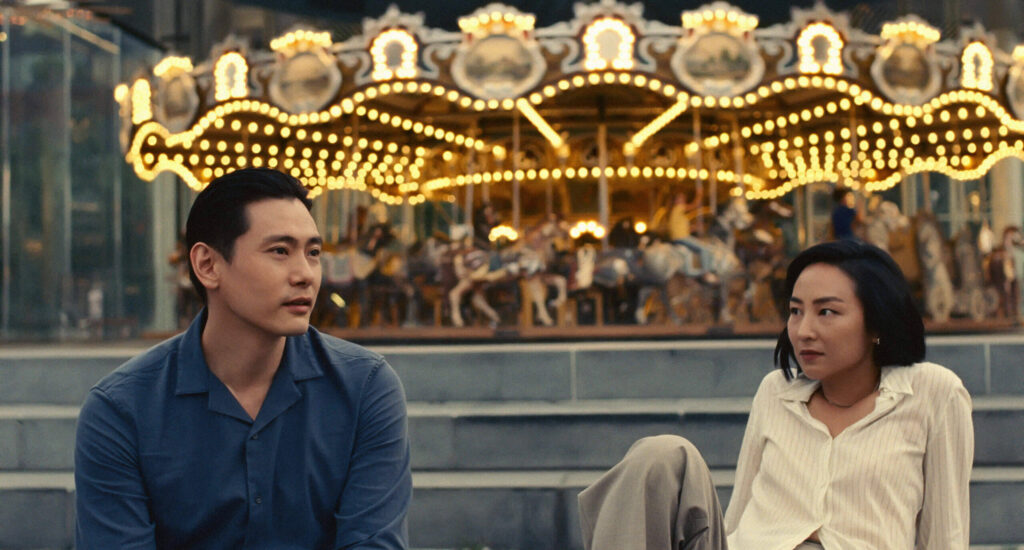
Many of my favorite 5-star films required a rewatch for me to truly appreciate their significance and greatness—Interstellar, My Neighbor Totoro, Little Women, Portrait of a Lady on Fire. I can imagine Past Lives being included on this list in the future. Celine Song’s complex and confident debut feature film is about the complex nature of loves lost and gained over time, about soul mates and marriage partners, about “what ifs” of the past and the gift of the present.
19. The Deepest Breath (Laura McGann)

One of my movie reviews which generated the most most pushback and animosity was my review of Free Solo, the harrowing documentary about an athlete with a singular vision for conquering nature (along with a kind of risk-loving death wish). The Deepest Breath has certain parallels to Free Solo in its in-depth exploration of a singular athlete—Alessia Zecchini—partaking in an extreme sport—freediving, where a person attempts to go as deep underwater as possible on a single breath in their lungs. The film is as intense as it is tragic, as its records both the amazing achievements of champion freedivers as well as the deadly cost of pushing the human body to its limits underwater.
18. Four Daughters (Kaouther Ben Hania)
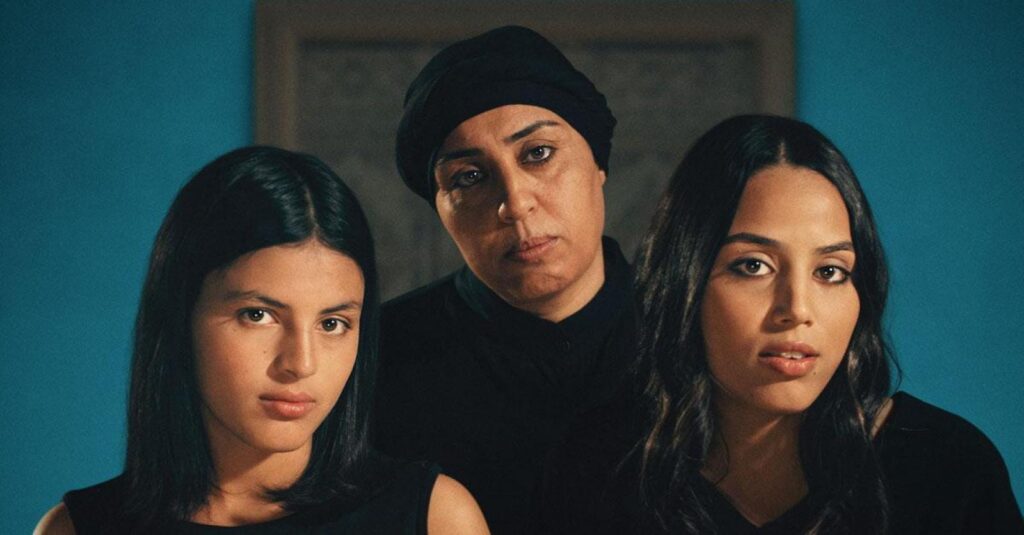
Olfa is the mother of four daughters. Two daughters, Eya and Tayssir, are still with her; the other two disappeared from their lives. Filmmaker Kaouther Ben Hania takes a unique approach in this documentary by hiring professional actors to portray Olfa and her missing daughters as the family recounts their memories of growing up in Tunisia under the threat of militant Islam. Both harrowing and heart-wrenching, this is documentary filmmaking as trauma therapy and exorcism.
17. Menus-Plaisirs – Les Troisgros (Frederick Wiseman)
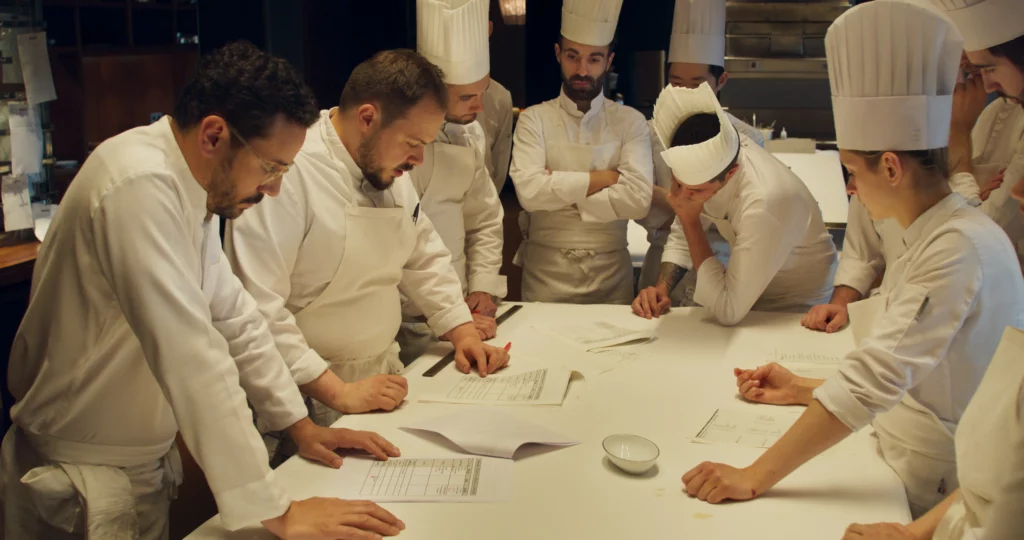
I hope to be as curious as 93-year-old documentarian Frederick Wiseman when I grow up. My first Wiseman doc was Monrovia, Indiana in 2018, which ended up being #11 in my top films of that year. This year, I watched his 1968 film High School, as well as this 4-hour documentary about a French family of chefs and their three high-end restaurants: Troisgros, Le Central and La Colline. “Cuisine isn’t the movies,” says the elder Troigros, Michel. It’s as if Wiseman’s documentary receives that statement as a challenge to overcome. The film is certainly a visual feast (ha!), but what impressed me most was the perfect tempo of Wiseman’s editing, which is perhaps the strongest of any film this year.
16. R.M.N. (Christian Mungiu)
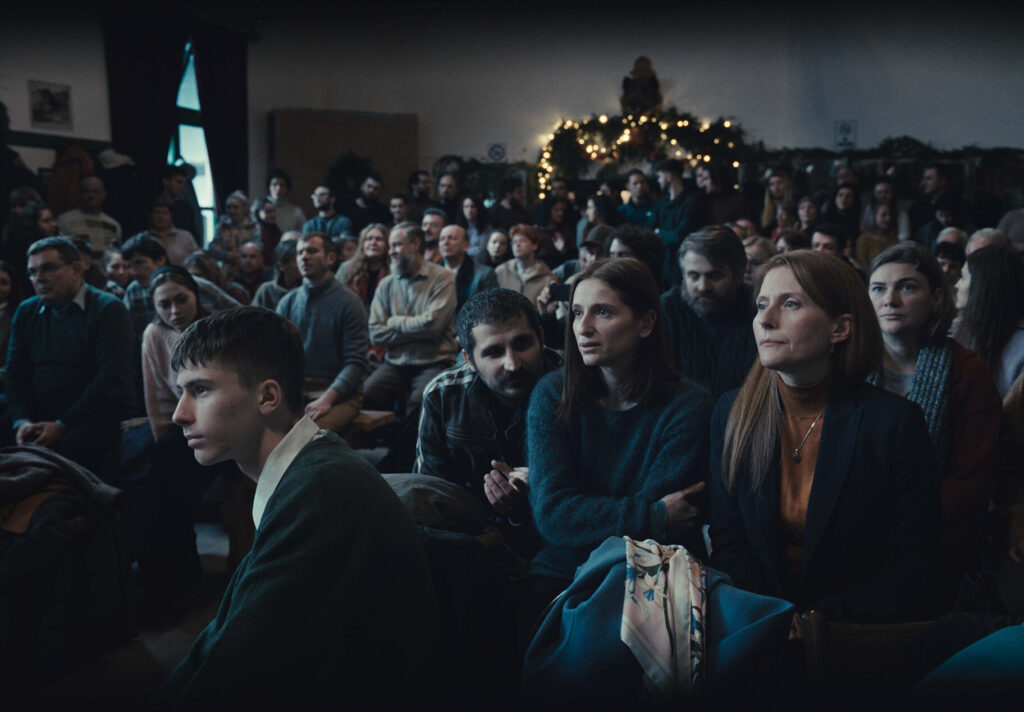
The first bleak Christmas movie on my list, R.M.N. is a Romanian acronym for nuclear magnetic resonance used in medical imaging; English speakers would call this an MRI. Christian Mungiu has explained the enigmatic title choice as being about the human condition, trying to detect and understand the interior of the human mind. The film focuses on a handful of characters in a tiny village in Transylvania during the Christmas season. When the local bakery hires some workers from Sri Lanka, it sets off the villagers’ xenophobia until it culminates in violence. Whatever your cultural background or worldview, R.M.N. suggests that fear-driven bigotry is a universal language.
15. The Holdovers (Alexander Payne)
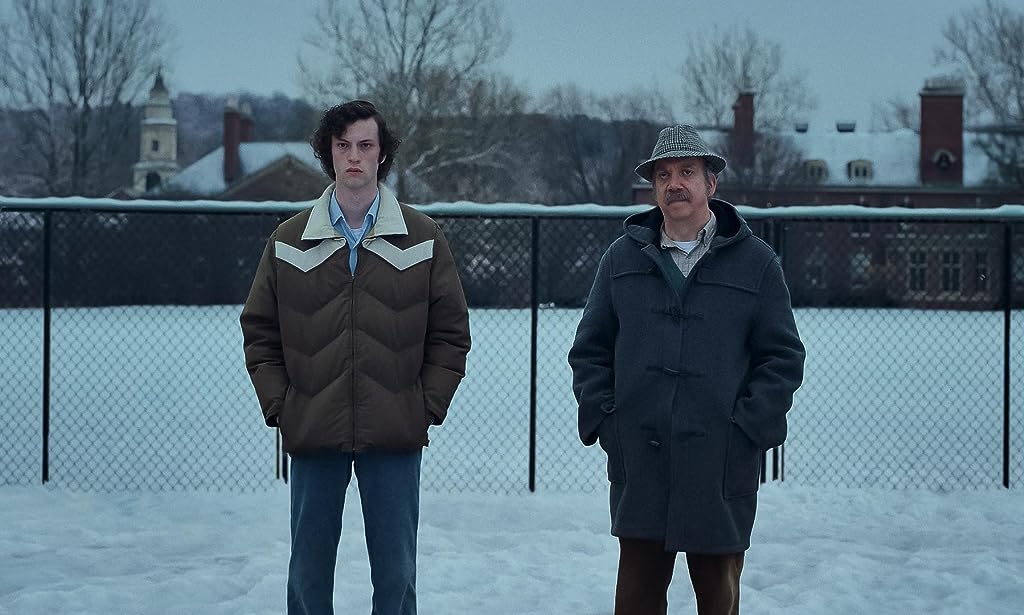
I watched this film—the second bleak Christmas movie on my list—with a good friend at an academic conference filled with folks like the pompous and cantankerous professor Paul Hunham (wonderfully portrayed by Paul Giamatti), who is forced to remain on the campus of his New England prep school during Christmas break as a kind of babysitter for a single student, Angus (Dominic Sessa). Accompanying the pair is Mary (Da’Vine Joy Randolph), the school’s cook who is still grieving the recent loss of her son in the Vietnam War. This is a comfort food movie: the narrative beats and characters are entirely familiar and rarely surprising, yet it’s also remarkably affecting and nuanced due to the three main performances.
14. Anatomy of a Fall (Justine Triet)
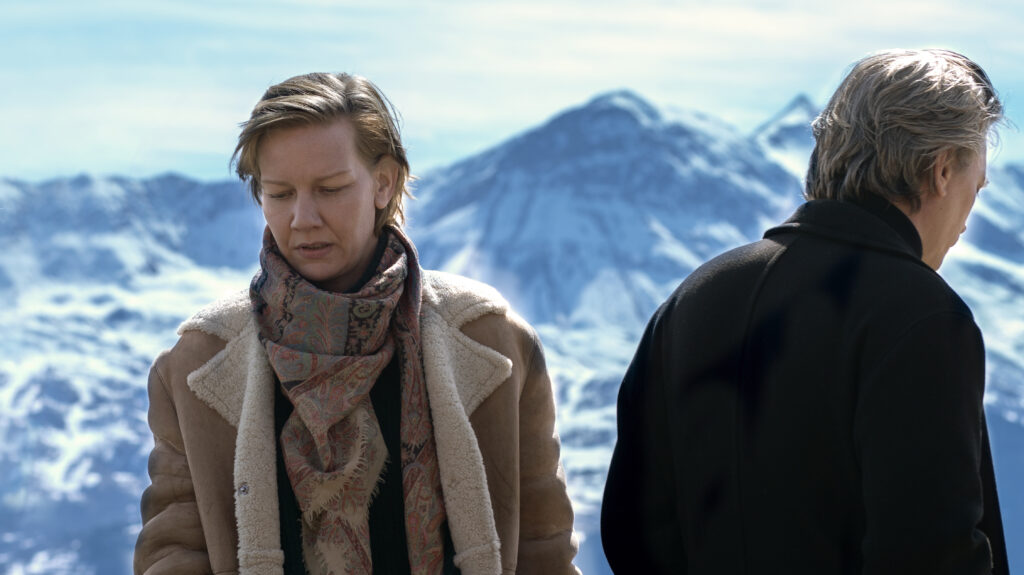
After her husband dies under mysterious circumstances at their chalet in the alps, Sandra (Sandra Hüller) becomes the prime suspect. The only human witness to the event is Sandra’s son, Daniel (Milo Machado-Graner), who is blind (the other witness is Daniel’s guide dog, Snoop). Was it a suicide? An accident? Murder? How are we to make sense of the events when we have such limited facts? In short, this is a film about hermeneutics—it’s interpretation all the way down. There is a lot to admire here—the acting, the script, the direction, the incredible doggo performance from Snoop—and the semi-ambiguous ending will force viewers to make their own judgments. Did she do it? You can go to DidSheDoIt.com to make your case.
13. Fallen Leaves (Aki Kaurismäki)
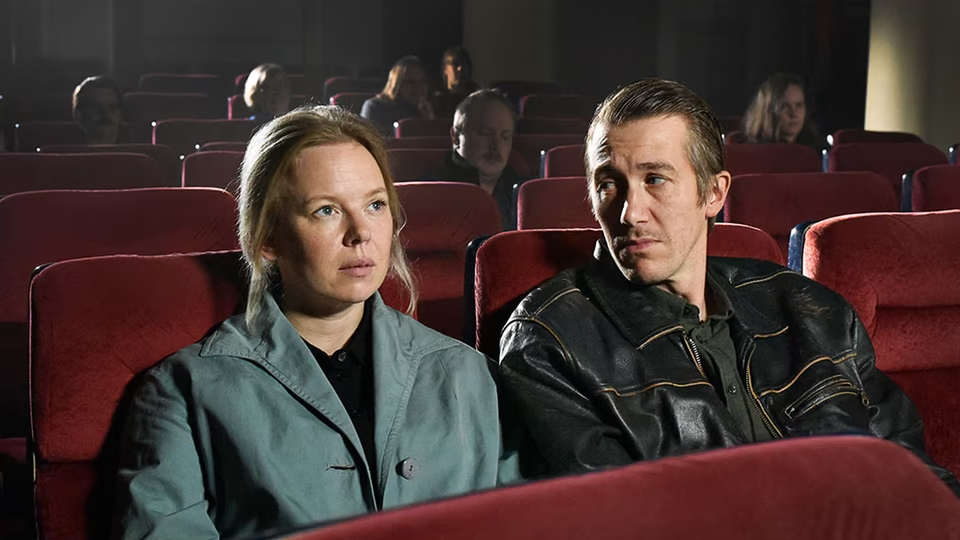
After declaring that he was retiring from filmmaking after 2017’s The Other Side of Hope, Aki Kaurismäki is back and as good as ever. Fallen Leaves is delightful blue-collar parable about two lonely souls, Ansa (Alma Pöysti) and Holappa (Jussi Vatanen) as they take on various odd jobs in order to make ends meet in contemporary Helsinki. Kaurismäki’s films are the very definition of droll, but this one feels particularly whimsical and hopeful. I bet the Dardenne brothers love it.
12. Spider-Man: Across the Spider-Verse (Joaquim Dos Santos, Justin K. Thompson, Kemp Powers)
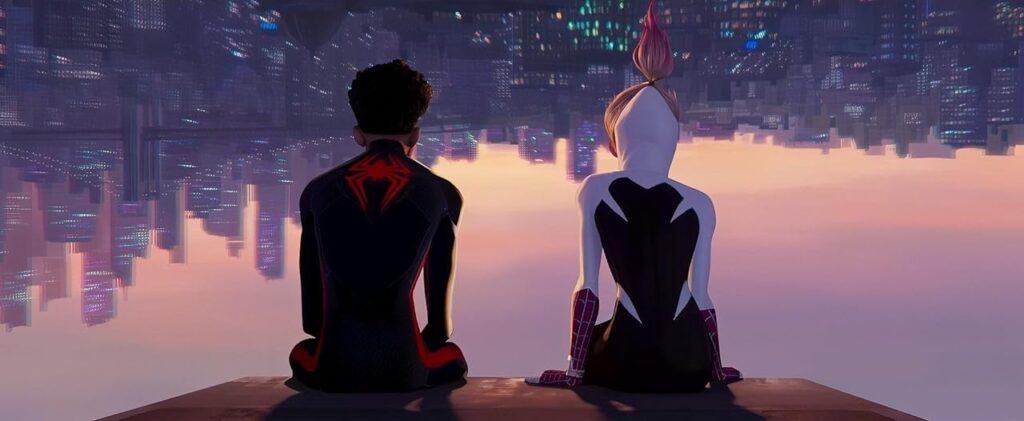
When I first saw Into the Spider-Verse in 2018, I wrote the following in my review: “SPIDER-VERSE is SO MUCH without being TOO MUCH.” I think Across the Spider-Verse is also SO MUCH, but is also a bit TOO MUCH. I absolutely Gwen and the painterly visuals in her universe. I loved the rebellious Hobie/Spider-Punk. I loved the visuals, the soundtrack, the comedy. I loved the ambition in the story-telling about story-telling and its exploration of what makes something “canon.” Still, I think I’m a bit weary of superhero multiversing and setting things up for the Next Episode. Let’s just hope they don’t resort to time travel in Beyond the Spider-Verse.
11. Perfect Days (Wim Wenders)
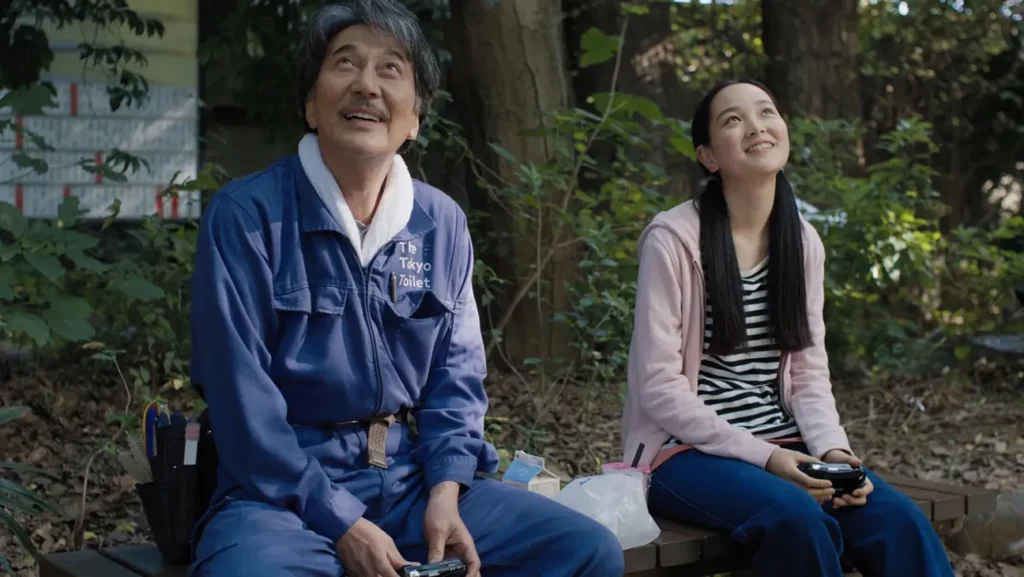
Wim Wenders’ Perfect Days feels like a companion piece to Jim Jarmusch’s Paterson (my favorite film of 2016). Where Paterson focused on a bus driver, Perfect Days shows us the life of a Tokyo toilet cleaner, Hirayama (Koji Yakusho), as he quietly goes about his work of scrubbing public restrooms with a surprising amount of joy. I get the sense that Hirayama truly loves his life as he listens to music, waters his plants, relaxes in a public bathhouse, visits a local eatery, etc. Nothing he does is remarkable, yet everything feels miraculous. Each day follows a liturgy of the ordinary, beginning with Hirayama emerging from his apartment and looking towards the sky with a genuine smile on his face as he greets the day. Toilets have never looked more beautiful.
10. You Hurt My Feelings (Nicole Holofcener)
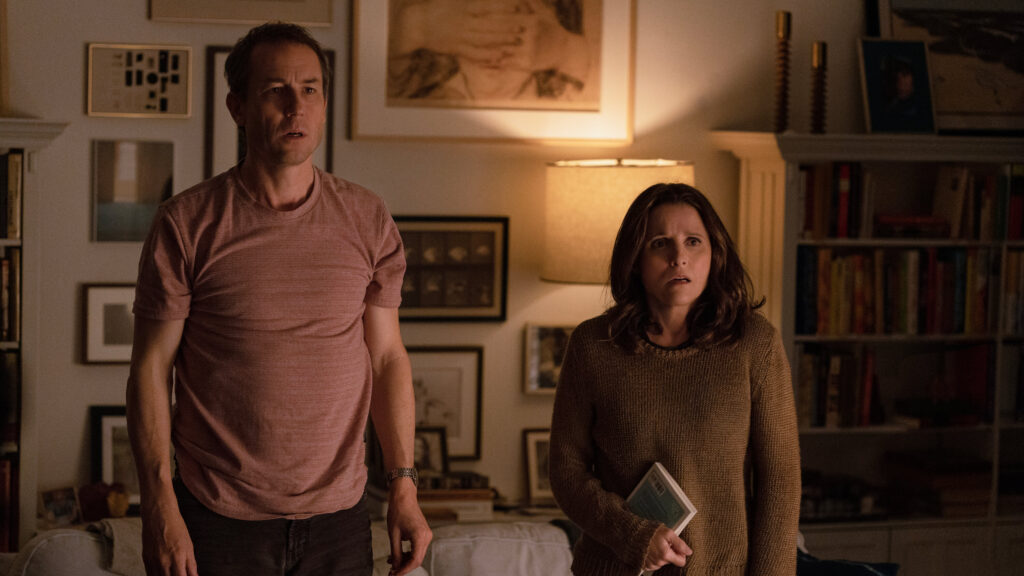
“Clear is kind,” is a bit of proverbial wisdom I picked up from Brené Brown this year, though it’s a value I’ve attempted to live throughout my entire adult life. We all recognize that honest and deep communication is so much better for relationships than the opposite; yet passive-aggressive, shallow, deceptive, and manipulative communication still prevails in so many families and marriages. This comedy from writer-director Nicole Holofcener made me laugh for its honesty, but it also sparked some great post-movie conversations with my wife about our marriage, our parenting, and our own goals and values. Comedic actors aren’t nearly given enough praise for their performances: Julia Louis-Dreyfus is just outstanding here, and I hope she gets the awards recognition she deserves. More well-written films for adults about life’s idiosyncrasies, please.
9. Showing Up (Kelly Reichardt)
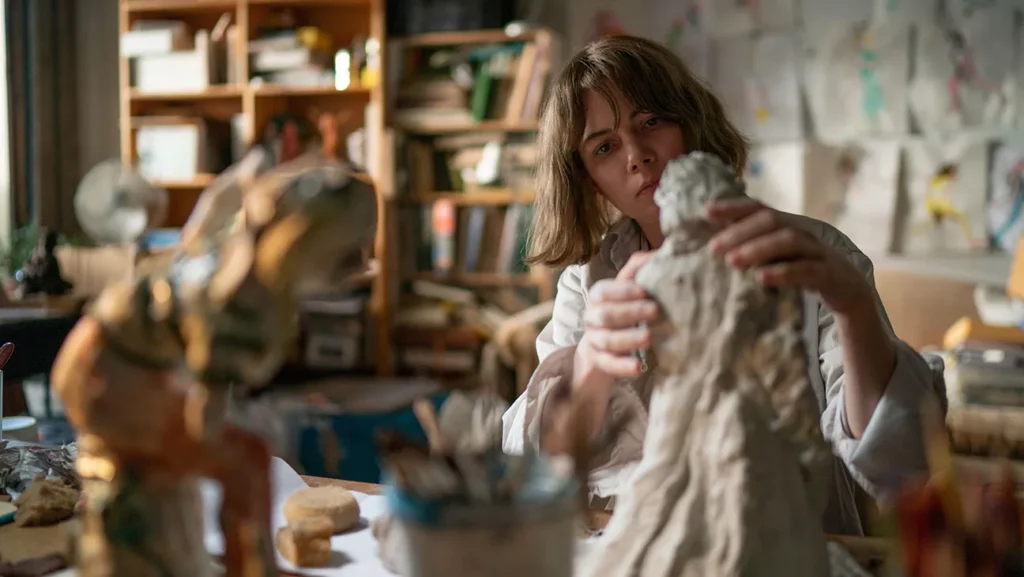
Somehow simultaneously relaxing and anxiety-inducing, this film about an artist (Michelle Williams) is one that I imagine will grow on me over time and revisits. I love movies about Portland and movies about art, so this is pretty much perfect. Filmmaker Kelly Reichardt has never made a bad film.
8. Are You There God? It’s Me, Margaret (Kelly Fremon Craig)
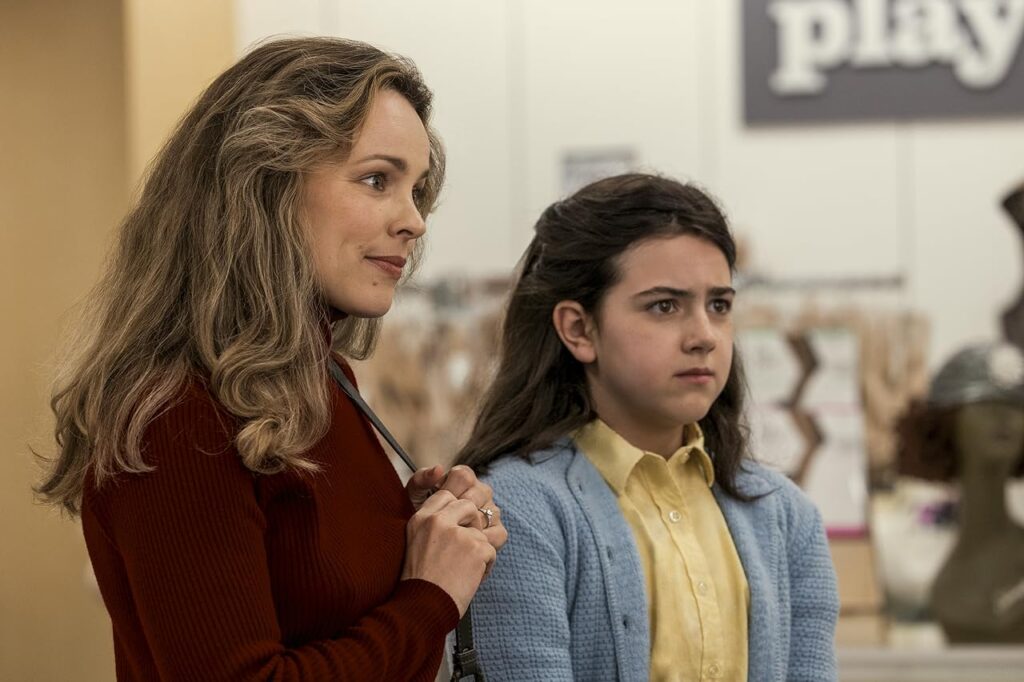
I love coming-of-age stories, so it was a delight to see Judy Blume’s classic come to life via writer-director Kelly Fremon Craig (The Edge of Seventeen). I love that the film expands its scope to give a closer look at Margaret’s mother (Rachel McAdams, in a great supporting performance) and grandmother (Kathy Bates, also great) as they navigate new chapters of their lives. Every performance is charming, every scene is meaningful, and every directorial choice serves the story and characters. I watched this a second time with my 12-year-old daughter sitting right next to me on the couch. Such a gift, this movie.
7. Bottoms (Emma Seligman)
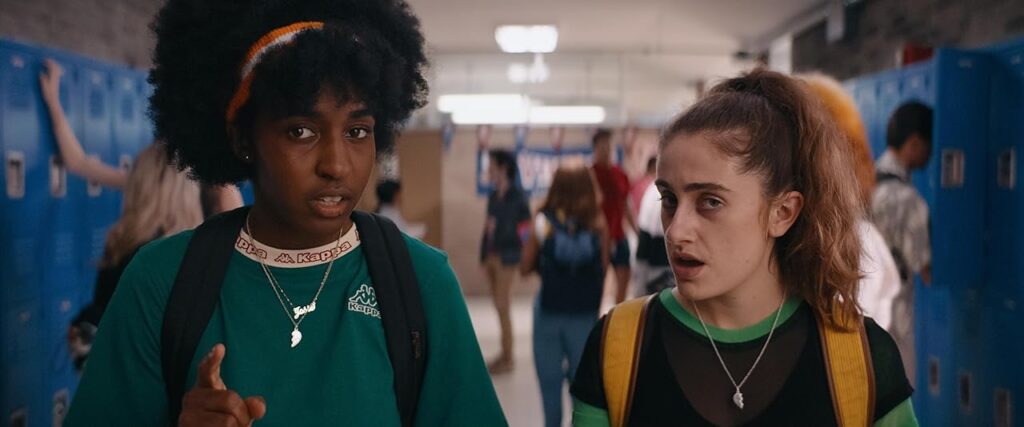
Brilliant, hilarious, and deranged, Bottoms made me laugh harder than any other film from 2023. A smart-assed absurdist satire of high school movies and normative gender roles, Bottoms follows gay students PJ and Josie (Rachel Sennott and Ayo Edebiri) as they start a self-defense class/fight club in order to get popular girls to like them. Mayhem ensues. Ruby Cruz as their friend Hazel gives an incredible feature debut performance, as does “Beast Mode” Marshawn Lynch as the teacher who unwittingly sponsors their fight club.
6. May December (Todd Haynes)
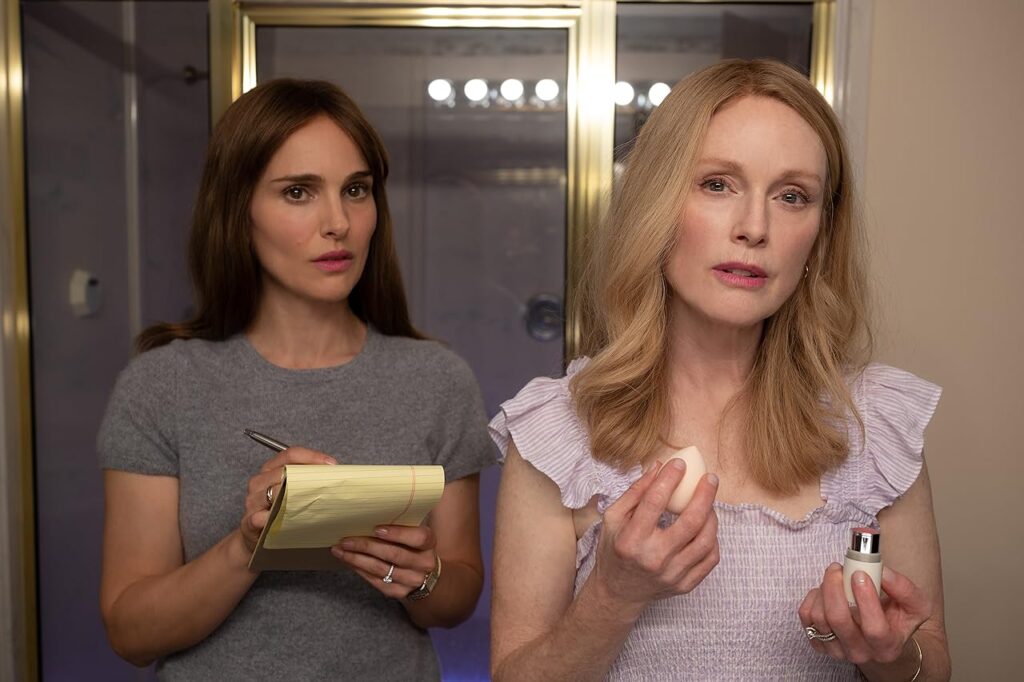
Somehow simultaneously campy and cerebral, May December is essentially a brilliant satire of a Lifetime movie featuring some of the best performances from 2023. Indeed, May December is a film about the ubiquity of Performance, about the blurred boundaries between reality and a role, and about how our identity is often found somewhere in the in-between. There’s Charles Melton’s powerful portrayal of Joe, a young father who never got the opportunity to truly grow up due to the traumatizing experiences of his childhood (the very experiences that made him a father in the first place). There’s Julianne Moore’s disconcerting Gracie, the woman who seduced the adolescent Joe and now performs the role of caring Southern housewife. And then there’s Natalie Portman, who gives her strongest performance yet in a lifetime of great performances—the monologue she gives near the film’s coda is an all-timer, but she’s remarkable throughout the film as an actress portraying an actress learning how to perform a role.
5. The Boy and the Heron (Hayao Miyazaki)
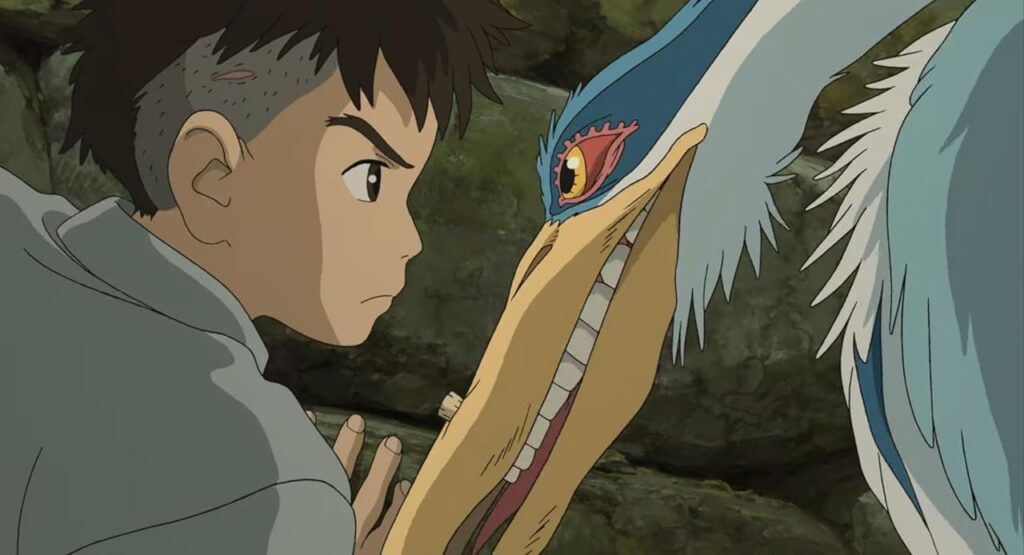
One of my favorite movie-going experiences in 2023 was seeing My Neighbor Totoro with my kids on the big IMAX screen at OMSI in Portland. I’m so grateful that I could take my entire family to see a new Miyazaki film in theaters. It’s a bit like Totoro, but for adults—trade the childlike whimsy for grownup grief, Totoro’s kindness for the heron’s cantankerousness. The story raises more questions than it answers, and I often found it difficult to follow the narrative logic. But grief also don’t follow logic. Death is not a problem we solve but a mystery we navigate.
4. Killers of the Flower Moon (Martin Scorsese)
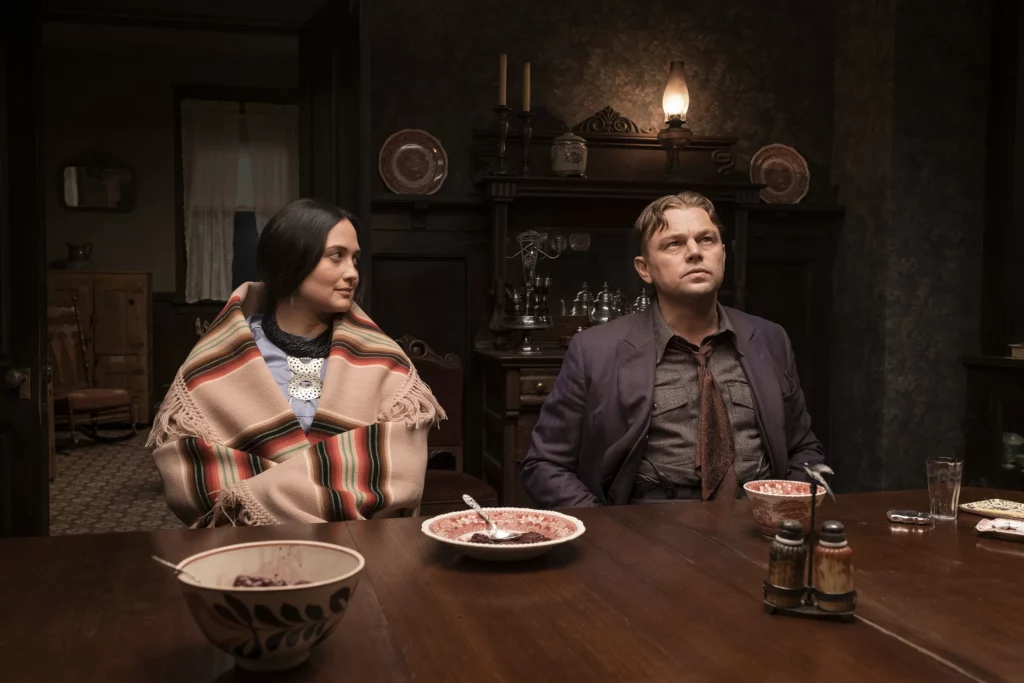
This is one of Martin Scorsese’s best films, with perhaps the strongest ending to any of his works. I’m not sure what else I can say. Marty’s done it again.
3. Asteroid City (Wes Anderson)
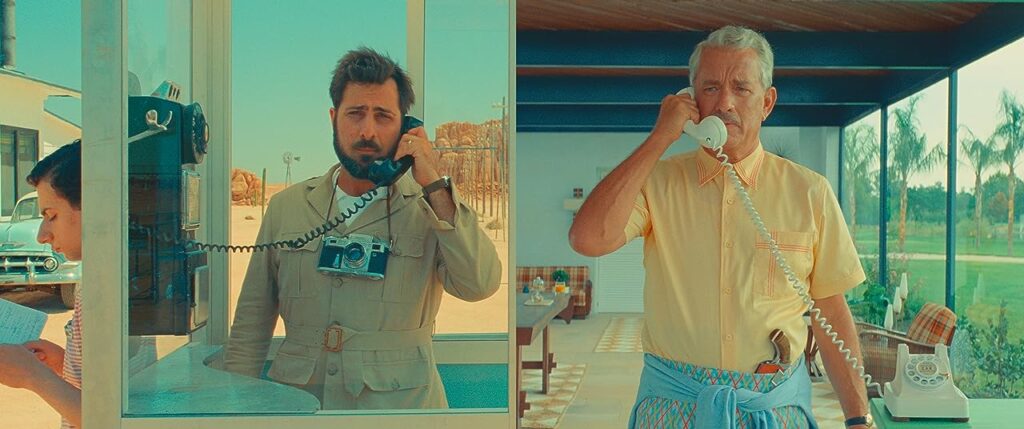
“You can’t wake up if you don’t fall asleep.” This is the repeated mantra of the actors performing the play for the television program which makes up the movie “Asteroid City.” This multilayered meta film is one of Wes Anderson’s finest, almost an apotheosis of his approach to cinematic world-building.There is a late scene where actor Jones Hall, playing war photographer Augie Steenbeck (Jason Schwartzman), asks the play’s director, Schubert Green (Adrien Brody) to help him understand the motivation for his character, wondering if he’s “doing” Augie right. “I still don’t know what the play’s about,” laments Jones/Augie. Green’s response: “Doesn’t matter. Just keep telling the story.” Every time the film gets to this moment, I burst into tears. I can’t really explain why. All I know is that, despite its obvious and deliberate artifice, the film is also deeply sincere and affecting.
1. (tie) Oppenheimer (Christopher Nolan) & Barbie (Greta Gerwig)
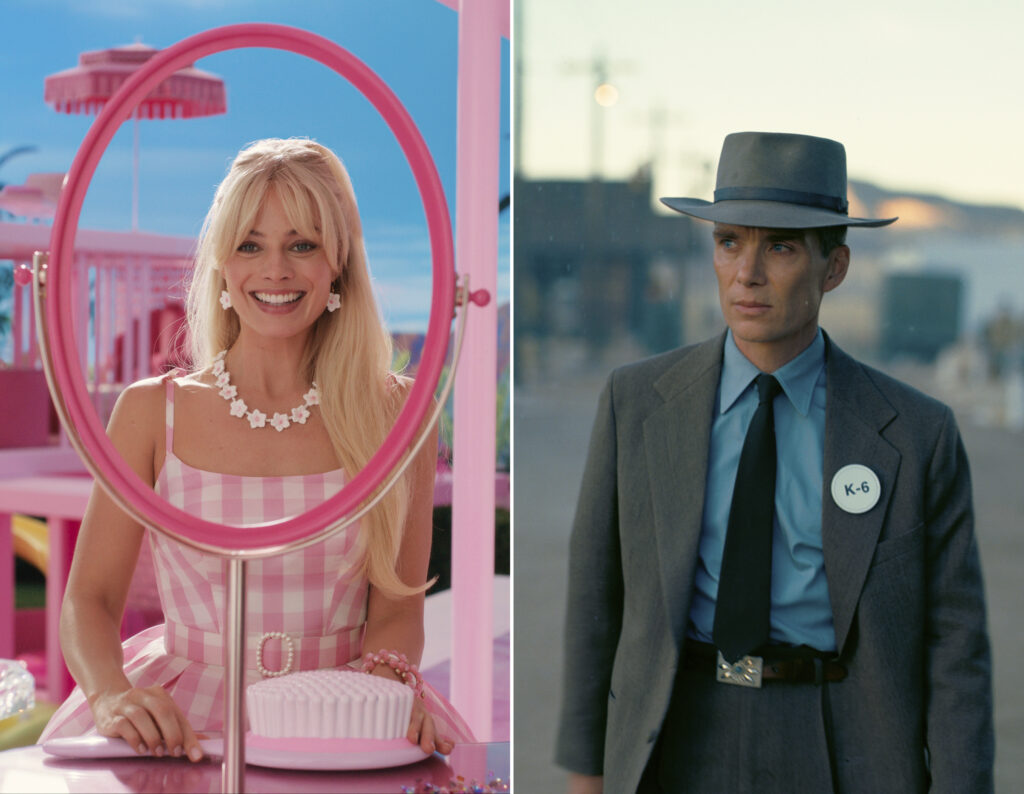
My favorite movie experience of 2023 was Barbenheimer. On July 21, hundreds of thousands of people flocked to movie theaters like they were going on a religious pilgrimage, eager to see the new films from Christopher Nolan and Greta Gerwig. And the films did not disappoint; from the direction to the performances to the editing to the production design, both are excellent films on every formal level. For all of their obvious differences—one is an epic biopic about the man who orchestrated the creation of the atomic bomb, the other a musical comedy based on a child’s toy—the two share a number of commonalities. Both films wrestled with the highs and lows of human ingenuity, how our innate creativity can be used for both good and ill, to build up and to destroy. Both films directly address existential concerns about humanity’s origins and telos—I’m convinced that these are deeply theological films, exploring questions about the meaning of life in view of the transcendent. Formally, both films utilized traditional/classic film techniques in their production (Nolan’s devotion to shooting on film stock and using practical effects instead of digital and CGI; Gerwig’s inspiring callbacks in her worldbuilding to cinematic giants like Jacques Demy, Jacques Tati, Gene Kelly, and Stanley Kubrick) in order to create cinematic worlds images which enraptured audiences. I first watched both films at independent movie theaters here in Oregon: Oppenheimer on 70mm at the Hollywood Theatre in Portland; Barbie at the quaint local Cameo Theatre in Newberg filled with pink-attired moms and daughters (and granddaughters). What the Barbenheimer phenomenon suggested is that people are hungry for the real: real beauty, real laughter, real tears, real community, real transcendent experiences. That an artistic medium based on images and illusions can provide a genuine sense of the real is one of its marvelous mysteries, one which keeps us coming back to the movie theatres for more.
Honorable Mentions (listed in alphabetical order)
Afire (Christian Petzold)
All of Us Strangers (Andrew Haigh)
American Fiction (Cord Jefferson)
Close (Lukas Dhont)
Rye Lane (Raine Allen-Miller)
The Starling Girl (Laurel Parmet)
The Teacher’s Lounge (İlker Çatak)
Tori and Lokita (Jean-Pierre and Luc Dardenne)
The Unknown Country (Morissa Maltz)
The Wonderful Story of Henry Sugar (Wes Anderson)
Leave a Reply